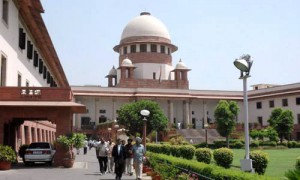 The Supreme Court on Friday, Jan 20, gave two Sahara group companies three weeks to choose between two courses to secure investments made by the public in their controversial Optionally Fully Convertible Debentures (OFCD) scheme — to either give a sufficient bank guarantee or earmark unencumbered, ‘sequestered immovable property’ under attachment of the court.
The Supreme Court on Friday, Jan 20, gave two Sahara group companies three weeks to choose between two courses to secure investments made by the public in their controversial Optionally Fully Convertible Debentures (OFCD) scheme — to either give a sufficient bank guarantee or earmark unencumbered, ‘sequestered immovable property’ under attachment of the court.
A bench headed by Chief Justice S H Kapadia also asked the two companies, Sahara Commodities Services Corporation (formerly Sahara India Real Estate Corporation) and Sahara Housing Investment Corporation, to sit with the Securities and Exchange Board of India (SEBI) and make sure investors in the scheme did not lose their money. A formal order will be passed after three weeks.
While the SC has stayed the Securities Appellate Tribunal order of October, asking the two companies to refund about Rs.40,000 crore to close to 30 million investors, it has repeatedly expressed its anxiety to protect the investors.
Sahara group counsel F S Nariman said the companies had furnished particulars of the evaluation of the companies, as demanded by the court earlier. Their assets met all the possible liabilities. Each query of Sebi has been answered. There had been no default and even premature redemptions had been given. There was no complaint from any investor, the counsel stressed. When he said the immovable properties would themselves meet all liabilities, the judges expressed apprehension, as these might have third-party liabilities. There might also be secured and unsecured creditors with claims against the group. It should be ensured the assets were enough to meet the liabilities.
Sebi counsel Arvind Datar said there were “64 companies in 64 towns” through which the group had called for investments. An examination of the income tax returns showed it had been “completely nebulous” in its transactions. By some manipulation of figures, the taxable income has become zero, counsel said.
Datar said it was difficult to monitor the group’s operations. They’d got only development rights of properties in certain cases, with the land not belonging to them. Any company could go into liquidation. There could be further complications in the development work involving partners, he said.





